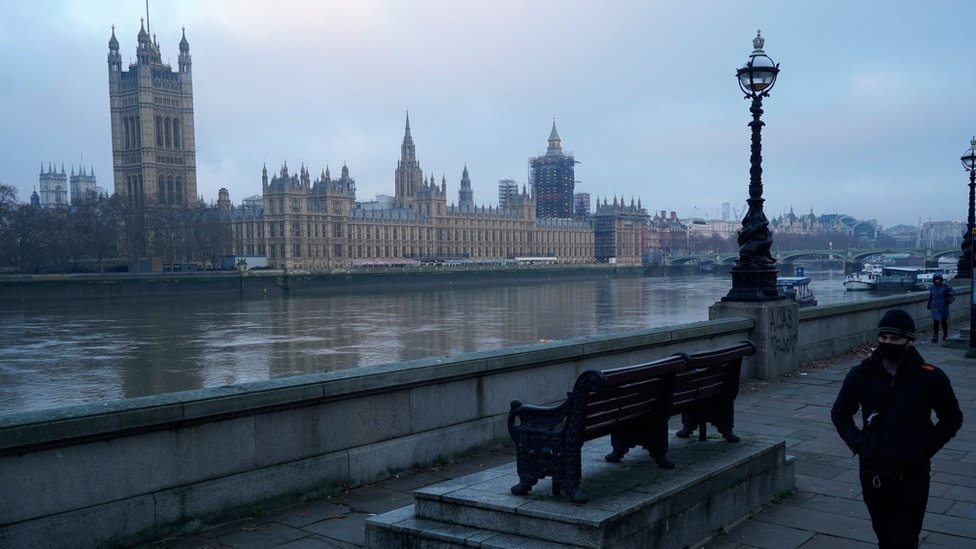The UK will cut ties with the European Union at 11pm - almost a year after officially leaving the 27-nation bloc.
The trade deal agreed between Boris Johnson and EU chiefs avoids the need for import taxes - tariffs - which many businesses had feared.
But there will still be major changes to rules on travel, immigration, commerce, living and working abroad - as well as crime fighting and security.
Haulage firms remain concerned about hold-ups at ports.
Fears of giant tailbacks of lorries at Dover - in the event of a no-deal exit from the EU single market and customs union - have receded, but uncertainty remains about new customs rules.
Among the things that will change from 23:00 GMT:
- Free movement of people between the UK and EU countries will end - to be replaced in the UK by a "points-based" immigration system.
- Anyone from the UK who wants to stay in most of the EU for more than 90 days in any 180-day period will need a visa
- Duty-free shopping will return, with people coming back to the UK from the EU able to bring up to 42 litres of beer, 18 litres of wine, four litres of spirits and 200 cigarettes without paying tax
- EU citizens wanting to move to the UK (except those from the Irish Republic) will face the same points-based system as people elsewhere in the world
- UK police will lose instant access to EU-wide databases on criminal records, fingerprints and wanted persons
- Traders in England, Scotland and Wales will have to complete more paperwork when dealing with EU countries
Unlike the rest of the UK, Northern Ireland will continue to follow many of the EU's rules, as its border with the Irish Republic remains all but invisible.
And the UK will gradually be able to keep more of the fish caught in its own waters, while the European Court of Justice will cease to have any role in deciding disputes between the UK and EU.

If you are Boris Johnson this is huge, and exciting.
If you are a business that's affected it might mean a big new opportunity, but it might also mean really big disruption and lots of extra hassle.
The fact that there is a trade deal doesn't take all of the risk away.
The treaty contains lots of uncertainty, not least for the biggest part of the economy: the service sector. Getting the agreement finalised in the time was a big achievement for both sides but there is a lot that it just doesn't cover that will, in time, have to be worked out somehow.

Brexit happened on 31 January 2020, but the UK has continued to follow Brussels' trade rules until now, while the deal was thrashed out.
It completes the process set in motion in June 2016, when, in a referendum, UK voters chose by 52% to 48% to leave the EU.
The free trade deal - agreed on Christmas Eve after nine months of negotiations - finally passed into UK law early on Thursday morning - having also been backed by Brussels.
Prime Minister Boris Johnson said: "The destiny of this great country now resides firmly in our hands."

But opponents say the country will still be worse off than it was while in the EU - and there is still uncertainty about what it will happen to banking and services, which are a major part of the UK economy.
The EU (Future Relationship) Bill, bringing the trade deal into UK law, was backed in the House of Commons by 521 to 73 votes on Wednesday, after Parliament was recalled from its Christmas break.
Labour supported it, with leader Sir Keir Starmer saying it was preferable to the UK severing ties with the EU without a trade deal, but other opposition parties voted against it.
European Commission President Ursula von der Leyen and European Council President Charles Michel signed the deal on Wednesday.


https://news.google.com/__i/rss/rd/articles/CBMiL2h0dHBzOi8vd3d3LmJiYy5jby51ay9uZXdzL3VrLXBvbGl0aWNzLTU1NDk3Njcx0gEzaHR0cHM6Ly93d3cuYmJjLmNvLnVrL25ld3MvYW1wL3VrLXBvbGl0aWNzLTU1NDk3Njcx?oc=5
2020-12-31 12:14:00Z
52781275482250
Tidak ada komentar:
Posting Komentar